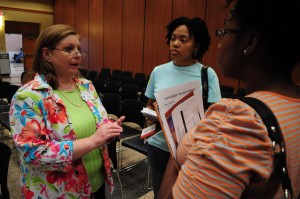By Christopher Harrell/reporter
Everyone occasionally feels blue or sad, but those emotions are typically short and go away within a few days, a SE counselor told students last week.
However, when one experiences depression, it can disrupt life and cause suffering for the individual and others who worry about the person, Michele Faith said during The Silent Epidemic April 22. Depression is a common disorder that affects millions of young people and can be a serious matter, she said.
Faith shared some best practices and helpful tips in dealing with depression and ways to help young people contemplating suicide.
“I want you to remember two things after taking this presentation in tonight,” she said. “One, preventing suicide is everybody’s business. And secondly, don’t be afraid to ask the question. Suicide affects everyone!”

Some common concerns students take to counselors relate to study skills, time management, financial issues, adjustment to college life and the need to balance work and school, Faith said. However, counselors are also there to give advice regarding fears, depression, eating disorders, sexual assault and self-inflicted injuries, she said.
Students often don’t go to counseling because they are embarrassed a friend might find out, have had poor experiences with other counselors, don’t like to talk to strangers or think they can handle things on their own, Faith said.
For young people 15-24 years old, suicide is the third-leading cause of death. Gay and lesbian teens are up to three times more likely to attempt suicide. Suicide is a major concern, Faith said. Around 30,000 people die by suicide each year in the United States — more than by homicide.
Although tragic, suicide is often preventable, she said. Knowing the risk factors and who is at risk can help reduce the suicide rate.
“Always keep an eye out for signs of suicide,” she said.
Signs include persistent sad or empty feelings, hopelessness, decreased energy, overeating, weapons at home, family violence, family history of suicide or conversations about suicide. She said people should always pay close attention if someone talks about suicide.
“A common myth is that people who die of suicide don’t talk about it beforehand,” she said. “Wrong! They often talk about it and are likely to try it. If you notice this, then that person is reaching out for help by talking to you. Don’t be afraid to ask the question.”
With advancement in technology, another risk is cyberbullying. Bullying happens on Facebook and Twitter, and young people are exposed to bullying 24/7 because of this, Faith said.
Anyone who is or knows someone contemplating suicide should seek help immediately by calling the National Suicide Prevention Lifeline at 1-800-273-8255 or if an immediate emergency by calling 911.
“Remember, preventing suicide starts with asking the question,” she said.

























